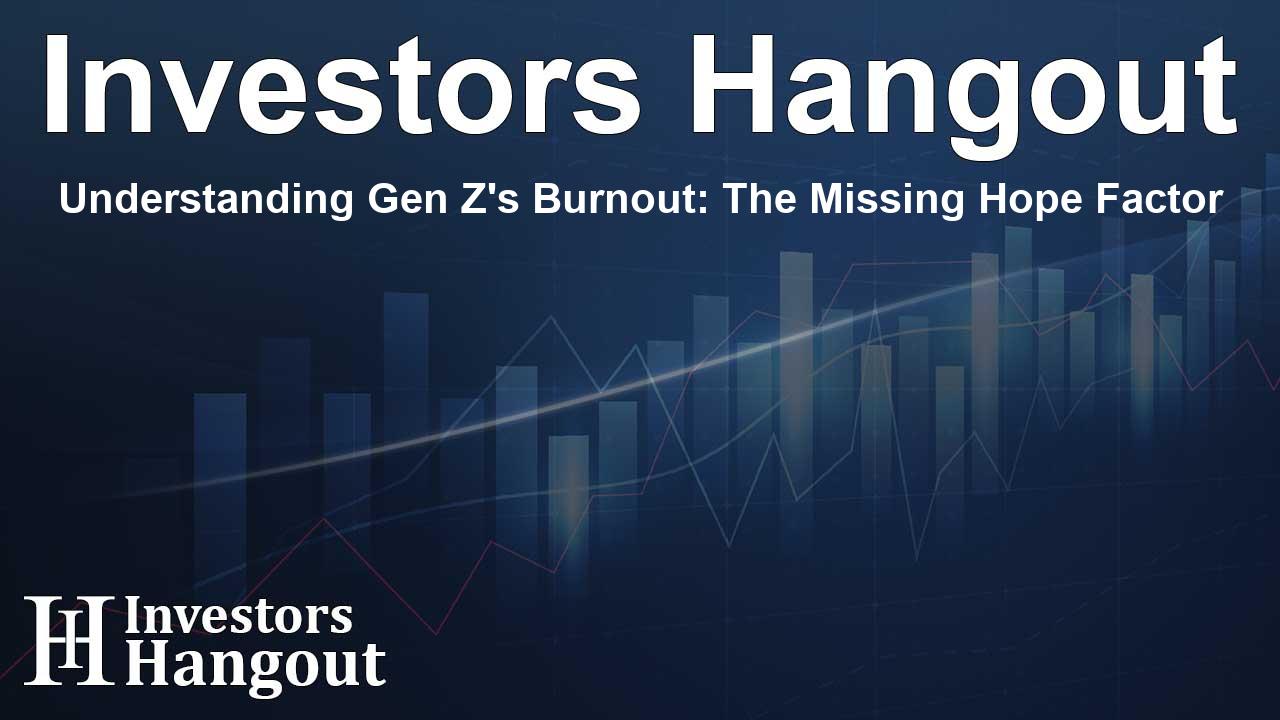Understanding Gen Z's Burnout: The Missing Hope Factor

Exploring the Roots of Generational Burnout
In recent discussions about workplace dynamics, the term "generational burnout" has emerged prominently, capturing the attention of many. Suzy Welch, a well-known author and educator, highlights the evolving reasons behind this trend, particularly among today's youth. While burnout has previously been linked to high workloads, she emphasizes that the essence of the issue now revolves around a waning belief that hard work will yield significant rewards.
The Changing Landscape of Work
Welch shared her insights during an episode on a popular podcast, addressing the rising struggle among younger generations, particularly Gen Z and millennials. Historically, many workers endured lengthy hours fueled by the conviction that dedication would lead to career progression and financial stability. However, this assumption appears to be shifting.
Insecurity in Today’s Job Market
She articulates a concerning reality where employees are now experiencing not just job-related stress but also a profound loss of trust in the system. "Employers cannot instill hope in their workforce amid uncertainties such as layoffs and job losses," Welch asserts. This fear contributes to an environment where young workers feel increasingly demoralized.
Understanding Burnout: More Than Just Workload
Recent studies verify Welch's observations regarding the mental health challenges faced by younger employees. A notable percentage of individuals under 35 express feelings of disconnection and burnout, exacerbated by modern social and economic constraints. Factors like isolation and passivity in communication can intensify adverse feelings associated with workplace culture.
Millennials and the Weight of Expectations
Interestingly, millennials feel the brunt of burnout as they grapple with unique pressures. Research indicates that a significant proportion deal with considerable stress stemming from work responsibilities, coupled with family obligations and staggering student debt. This demographic often finds themselves sandwiched between caring for young children and aging parents, and the impact is profound.
The Price of Student Debt
The burden of student loans looms large for many young adults. Current statistics reveal that Gen Z’s financial struggle is compounded by high housing costs, which leave many feeling priced out of home ownership. For instance, a large percentage of young people report they cannot afford to purchase homes, even as monthly loan payments are well above the national average.
A Crisis of Hope and Trust
A pivotal moment for Welch came during her conversation with a young freelancer who spoke candidly about feeling defeated. This conversation illuminated a critical generational divide regarding expectations around hard work and its rewards. For baby boomers, dedication often translated into tangible rewards such as promotions and mortgages. On the contrary, today’s younger workers face a harsher economic reality that continuously chips away at their aspirations.
Addressing the Root Causes of Burnout
The broader implications of burnout extend beyond individual distress. Research from various institutions reveals that workplace stress can drain massive financial resources from businesses, leading to losses in productivity and skyrocketing healthcare costs. As younger generations will represent a considerable portion of the workforce moving forward, the necessity for employers to foster hope and engagement is critical.
Reframing Effort and Belief
Welch draws attention to the stark difference between the perspectives of past and current workers. While older generations navigated arduous schedules with optimism about their sacrifices ultimately bearing fruit, younger employees increasingly question whether putting in effort will lead to real advancement. This shift in mindset could redefine the future landscape of work.
Frequently Asked Questions
What causes generational burnout among young workers?
Generational burnout is primarily caused by lost hope in the belief that hard work will lead to tangible rewards, compounded by economic challenges such as high student debt and housing costs.
Why is the concept of hard work different for Gen Z?
Unlike earlier generations who often saw clear rewards for their efforts, Gen Z faces an uncertain job market and financial burdens that complicate their ability to believe in the payoff of hard work.
How do financial pressures impact young workers' mental health?
High financial pressures, like student loans and soaring housing costs, contribute to feelings of stress and burnout among young workers, leading to mental health challenges.
What can employers do to help reduce burnout in younger workers?
Employers can help reduce burnout by creating supportive environments, fostering open communication, and providing resources that promote mental wellness and career growth.
Is the perception of work-life balance changing?
Yes, many young workers now prioritize work-life balance differently due to the overwhelming stress associated with financial responsibilities and unrealistic job expectations.
About The Author
Contact Henry Turner privately here. Or send an email with ATTN: Henry Turner as the subject to contact@investorshangout.com.
About Investors Hangout
Investors Hangout is a leading online stock forum for financial discussion and learning, offering a wide range of free tools and resources. It draws in traders of all levels, who exchange market knowledge, investigate trading tactics, and keep an eye on industry developments in real time. Featuring financial articles, stock message boards, quotes, charts, company profiles, and live news updates. Through cooperative learning and a wealth of informational resources, it helps users from novices creating their first portfolios to experts honing their techniques. Join Investors Hangout today: https://investorshangout.com/
The content of this article is based on factual, publicly available information and does not represent legal, financial, or investment advice. Investors Hangout does not offer financial advice, and the author is not a licensed financial advisor. Consult a qualified advisor before making any financial or investment decisions based on this article. This article should not be considered advice to purchase, sell, or hold any securities or other investments. If any of the material provided here is inaccurate, please contact us for corrections.
